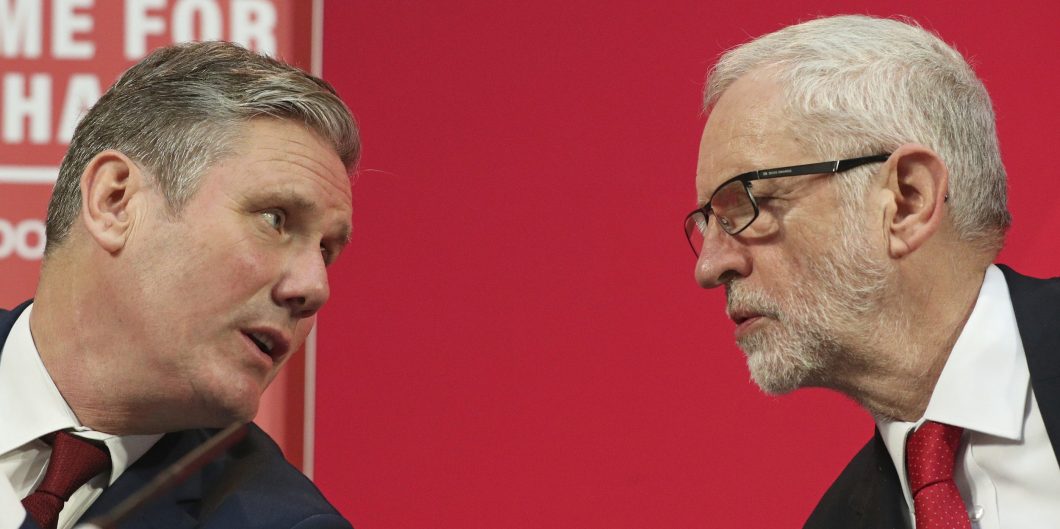A two-party partnership of extremes whose common denominator is a cavalier attitude toward government spending and debt.
Banging on About Europe
In May this year, Sir Keir Starmer, Labour’s newly elected leader, rejected the possibility of an extension to the Brexit transition period. It is fair to say this surprised many people, including me. Starmer was Remain’s standard-bearer during the December General Election—far more so than Jeremy Corbyn. The architect of his party’s plan to hold a second referendum, Starmer’s commitment to Europe was never anything less than wholehearted.
Of course, one could argue he was cognisant of the immensity of Labour’s electoral defeat—and that his referendum policy played a role in it—and hamstrung by coronavirus, but the limp way he rolled over suggested other things were in play.
Those “other things” are elucidated at length, and with wonderful clarity, by Adrian Williamson QC in Europe and the Decline of Social Democracy in Britain: From Attlee to Brexit. In short, Starmer made no attempt to relitigate Brexit or extend the transition period because “Europe” and “banging on about it” deracinated British politics (both major parties and all the minors) for the best part of 50 years. The extent of it is hard to credit, but Williamson pulls it off con brio.
Yes, I always knew Labour had a Europe problem before the Tories had a Europe problem. What I didn’t know was how bonkers it became. Perhaps this is a function of knowing Conservative history better than Labour history; after all, the Tories are my party. When they were terribly divided and had their heads wedged firmly up their bums, I noticed it and felt keen and intense disappointment. Williamson gives equal billing to both parties, but if you are on the right or centre-right it’s the Labour Party’s story that is most compelling. “Europe” somehow managed to live rent-free in everyone’s head and impeded policy development and good governance in both parties for a very long time.
Williamson’s central thesis is that British affection for the EU and its predecessor entities waxed and waned with the popularity of social democracy as a system of governance and source of policy. The greater the extent to which a form of social democracy prevailed—whether emerging from the centre-left or centre-right—then the more likely figures from the Prime Minister on down would seek to engage with the EU (EC, EEC, Common Market), in the first instance by making repeated applications to join (rebuffed, as is well known, by General De Gaulle) and, later, by campaigning vigorously to stay in/remain.
In contrast, when both the majors were animated with a different governing philosophy—whether socialism, classical liberalism, or neoliberalism—then the EU-UK unity ticket started to come apart. This happened even when a given party or leader was publicly in favour of the EU. Williamson makes a compelling case that Tony Blair actually undermined public support for continued membership not only because in 2004 he grossly underestimated the very high rates of immigration from newly admitted members of the bloc.
At least some of the cooling relationship came about thanks to Blair’s attempts to “spin” EU Commissioners and individual European leaders in much the same way as he “spun” the Great British Public over events like the Iraq War or policy conundrums like the dependence of British economic growth on “high and increasing levels of household debt, fuelled by house price inflation and low interest rates.” Eventually, New Labour’s spinning ran out of steam and people in both the UK and EU were none too pleased.
Unlike many commentators (and not just on Brexit), Williamson takes care to fill often ambiguous terms (particularly “social democracy” and “neoliberalism”) with substantive content. Europe and the Decline of Social Democracy in Britain is, for that reason, one of the few books I’ve read that draws meaningful and intelligent distinctions between classical liberalism (which animated Margaret Thatcher) and neoliberalism (which animated Blair, David Cameron, and Nick Clegg).
Williamson sets out how the British social democratic tradition focused on achieving significant economic equality and (close to) full employment. It engaged the trade unions in voluntarism and brokered agreements rather than using parliament to enact the sort of legislated wage and working settlements that exist in countries like Australia or France. His early chapters—heavy with the phrase “social justice” in quoted material from Labour MPs and Labour-supporting journalists alike—is a startling reminder of how that term was first hollowed out and then filled with entirely unrelated innards. “We have, in this country, much of which to be ashamed,” wrote one. “The grip of a class system […] is extraordinarily strong” wrote another. “The solution is social justice,” the first chap continued. This meant pursuing “expansionist and egalitarian policies.”
Of course, this cosy, voluntarist arrangement broke down when inflation went through the roof and the UK was forced to go cap-in-hand to the IMF, but it also worked for a long period before it careered off the rails. This is something to remember for those who associate the collapse of British social democracy only with the 1978-9 Winter of Discontent. Likewise, those who note only that the Global Financial Crisis brought “the Great Moderation” to a close forget that the latter, too, worked for a long time. There is a reason many people look back on both periods with nostalgia and hope that politics can once again be “normal.”
As an aside, it’s worth observing that neoliberalism emerges as thin gruel, whether centre-left or centre-right in execution. This is something I’ve long suspected (which is why, when people in my social circle started voluntarily calling themselves “neoliberals” I found myself increasingly alarmed). Blair and Cameron really were empty spinners and often did not understand what pulling various policy levers would actually do to the country’s economy (PFI and Austerity come in for particular criticism).
Neoliberalism fails to provide an adequate account of the way social class works in Britain, something that has in more recent times culminated in persons ostensibly on the political left supporting corporations when they sack employees for their political views and shouting “Hands Up, Don’t Shoot” at London’s unarmed Metropolitan Police. A friend of mine calls Britain’s Black Lives Matter marchers “Kind Young Capitalists.” As part of their fealty to both identitarianism and crony capitalism, KYCs give not a fig for people living in poverty and are happy to film statues falling into harbours with smartphones manufactured in part by child slaves.
Social democracy and classical liberalism, by contrast, are in Williamson’s account real intellectual traditions with serious heft. F.A. Hayek (for Thatcher) and Tony Crosland (for Harold Wilson) were major scholars in their own right who had worked out in advance many of the implications that arose from enacting the policies they advanced. Labour’s socialist and democratic socialist traditions, meanwhile, completely lost their moral moorings as they abandoned Clement Attlee’s and Ernest Bevin’s Atlanticism and went all-in for unilateral nuclear disarmament and support for a Palestinian state. This proved crucial when socialists in Labour later led its 1975 opposition to staying in what was then the European Economic Community.
Williamson’s discussion of how “banging on about Europe” passed from Labour to Conservative is valuable because it exposes things both parties (and many commentators) believed to have been left behind, and explains Starmer’s recent manoeuvres.
In short, socialist opposition to the EC/EEC/EU within Labour never resonated because, after the departure of the likes of Attlee and Bevin, socialism became captive to a weird form of post-colonialism that has never enjoyed significant traction in the UK. Scenes at the 2019 Labour Party Conference—where Palestinian flags outnumbered Union Jacks and Jeremy Corbyn announced his pronouns—had decades-old roots in a tradition that has proven deeply unpopular at every election where it enjoyed a clear run at power.
In turn, neoliberalism produced leaders in favour of joining/remaining in the EU but incapable of the largeness of mind that animated Thatcher’s early support for the bloc, let alone the support of a Wilson, Roy Jenkins, or Edward Heath. Williamson recounts how Thatcher believed New Labour and Tony Blair to be “her greatest achievement” because “we forced our opponents to change their minds.” She was wrong: there was no mind to change. Some people were aware of this fundamental shallowness. David Lipsey—one of Crosland’s special advisers during the latter’s time in the Wilson ministry—asked “why, in Britain of the 1980s, do the comers against Crosland’s Castle seem so numerous and the defenders so dispirited?” Crosland-style social democracy slowly fell out of favour, something not unique to Britain—French, German, Italian, Polish, Scandinavian, and Dutch social democratic parties alike have been reduced to an electoral rump in recent years.
A sense of the extent to which Europe interfered with, well, everything pervades the book. “Events occurred, and problems piled up, regardless of the state of European negotiations,” Williamson observes at one point. “In October 1966, the Cabinet had agreed to meet at Chequers on a Saturday to thrash out these issues. The previous day, 144 people, including 116 children, had died when a coal tip collapsed at Aberfan.” Such was the importance attached to Europe that “Wilson reached Chequers at 2:30am on the Saturday, straight from a visit to the disaster.”
In 1966, of course, it was Labour tearing itself to bits over Europe; the Tories were almost wholly in favour. In the 1975 referendum, 85 per cent of Tory voters supported “Yes” (Remain); Labour voters, by contrast, split right down the middle on the issue. In an early warning of what would happen in 2016 and 2019, being working-class—C2DE in the British classification—was the strongest predictor of opposition to continued membership.
Williamson’s discussion of how “banging on about Europe” passed from Labour to Conservative is valuable because it exposes things both parties (and many commentators) believed to have been left behind, and explains Starmer’s recent manoeuvres. Tories, it turned out, could agree with Labourites like Tony Benn or Peter Shore on sovereignty. Labourites—including many socialists—found themselves in agreement with Enoch Powell because the EU was a vector for the sort of immigration that makes an unholy mess of both native working-class employment and the ability of centrally-funded services to cope. The book also benefits from a studied refusal to discuss developments since Leave’s victory in 2016. By stopping on 23 June 2016, Europe and the Decline of Social Democracy in Britain ensures there is at least some distance between “us” and “them, in the recent past.” That distance is worth the sort of careful consideration Williamson gives it.

